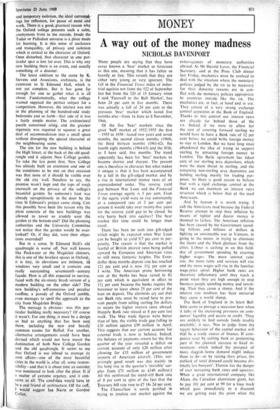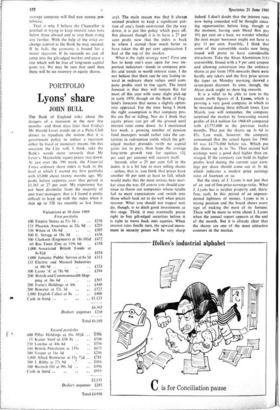A way out of the money madness
MONEY
NICHOLAS DAVENPORT
Many people are saying that they have never known a 'bear' market so ferocious as this one, meaning that it has fallen so heavily so fast. This reveals that they are either very young or very ignorant. The fall in the Financial Tinier index of indus- trial equities not from the 522 of September last but from the 520 of 15 January when I said 'Farewell to the Bull Market', has been 24 per cent in five months. There was actually a fall of 24 per cent in the previous 'bear' market which lasted five months also—from 16 June to 8 November, 1966.
Of the five 'bear' markets since the great 'bull' market of 1952/1955 the first —1955 to 1958—lasted two years and seven months, the second eleven months (1960), the third thirteen months (1961-62), the fourth eight months (1964-65) and the fifth, as I have said, five months. The trend apparently has been for 'bear' markets to become shorter and sharper. The present one is therefore in character but what makes it unique is that it has been accompanied by a fall in the gilt-edged market and by a rise in international money rates of an unprecedented order. The reverse yield gap between War Loan and the Financial Times average equity is 5 per cent. Even if the equity yield were to rise consistently at a compound rate of 3 per cent per annum it would take over twenty-five years for the reverse yield gap to be closed. So why hurry back into equities? The bear market this time could be longer than usual.
There has been no rush into gilt-edged which might be expected when War Loan can be bought to yield 9.7 per cent in per- petuity. The reason is that the market is fearful of British interest rates being pulled upward by European and American rates to still more fantastic heights. The Euro- dollar three months deposit rate has touched 124 per cent and is now 114 per cent as I write. The American prime borrowing rate at the banks has been raised to 84 per cent which is equivalent in effect to 114 per cent because the banks require the borrower to leave about 25 per cent of the loan on deposit. The alarmists cry out that our Bank rate must be raised here to pre- vent people from selling sterling for dollars to secure the higher interest rates abroad. Happily Bank rate stayed at 8 per cent last week. The May trade figures were better than of late, the visible trade gap falling to f20 million against £59 million in April. This suggests that our current account for external trade is now in balance. Indeed, the balance of payments return for the first quarter of the year revealed a deficit on current account of only £20 million after allowing for £33 million of government imports of American aircraft. (This sur- prisingly good result was due mainly to the lusty rise in the quarter's 'invisible' sur- plus from £71 million to f140 million.) All this reinforced the stand-still Bank rate of 8 per cent in spite of the fact that the Treasury bill rate rose to £7 I8s 2d per cent. The Chancelleor is surely justified in trying to insulate our market against the
extravagances of monetary authorities abroad. As Mr Harold Lever, the Financial Secretary, said at the Press Club dinner last Friday, mechanics must be evolved to deal with the situation where the monetary policies judged by the us to be necessary for their domestic reasons are in con- flict with the monetary policies appropriate to countries outside like the ux. The mechanics are, in fact, at hand and in use. They consist of a very strong exchange control apparatus at the Bank of England. Thanks to this control our interest rates are already far behind those of the us. Indeed, if we were to allow for the cost of covering forward sterling we would have to have a Bank rate of 12 per cent before we could bribe foreign money to stay in London. But we have long since abandoned the idea of trying to support sterling by attracting foreign money to London. The Basle agreement has taken care of our sterling area depositors, which were the main threat to sterling, and the remaining non-sterling area depositors are holding sterling mainly for trading pur- poses. So there is good reason to believe that with a rigid exchange control at the Bank we can maintain an interest rates structure which is below that of the mad Americans.
And by heaven it is worth trying. I call the Americans mad because the Federal Reserve attempt to stop their inflation by means of tighter and dearer money is doomed to failure. The American inflation has been caused by the Government spend- ing billions and billions of dollars in fighting an unwinnable war in Vietnam, in going to the moon, in trying to eliminate the slums and the black ghettoes from the cities. Labour is cashing in on this field- day of government spending by exacting higher wages. The more interest rates rise, the more rents and services will rise and the more wages will rise in the familiar wage-price spiral. Higher bank rates are therefore inflationary until they reach a point when they are high enough to stop business people spending money and invest- ing. Then they cause a slump. And if the interest rate madness has been universal they cause a world slump.
The Bank of England in its latest Bul- letin seems to presage a recession here when it talks of the increasing pressures on com- panies' liquidity and access to credit. 'They are unlikely to find outside funds readily available', it says. 'Nor to judge from the recent behaviour of the capital market will that be a ready source of finance. If com- panies react by cutting back or postponing part of the planned increase in fixed in- vestment—which indeed the prospect of more sluggish home demand might induce them to do—or by raising their prices, the outlook of total demand could become dis- tinctly less buoyant'. Therein lies the danger of ever increasing bank rates and squeezes. When a great international company like Alcan, the Canadian aluminium giant, has to pay 104 per cent at 99 for a loan stock which goes immediately to a discount we are getting near the point when the
average company will find new money pro- hibitive.
That is why I believe the Chancellor is justified in trying to keep interest rates here below those abroad and to stop them rising any further. With the help of the strict ex- change control at the Bank he may succeed. If he fails, the economy is bound for a minor recession. If he succeeds we can all jump into the gilt-edged market and enjoy a rise which will be free of long-term capital gains tax. We may be sure that until then there will be no recovery in equity shares.







































 Previous page
Previous page